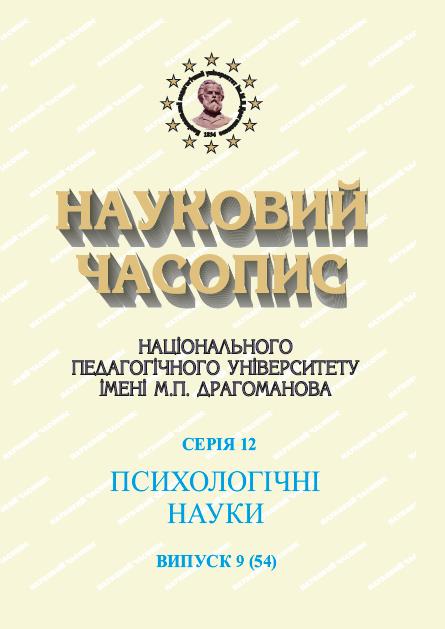PSYCHOLOGICAL FEATURES OF EMOTIONAL BURNOUT SYNDROME IN THE MANAGERS OF COMMERCIAL ORGANIZATIONS
DOI:
https://doi.org/10.31392/NPU-nc.series12.2020.9(54).13Keywords:
emotional burnout, anxiety, neurotization, stress, managers of commercial organizations, professional deformation.Abstract
The theoretical analysis of scientific approaches to the interpretation of the concept «Emotional burnout» is presented in the article, its symptoms are covered. Emotional burnout is a state of emotional, mental, physical exhaustion that develops as a result of chronic stress caused by one’s own work and combines emotional devastation, depersonalization and reduction of one's personal achievements. The causes and peculiarities of emotional burnout are revealed. The main groups of factors that cause the emergence of emotional burnout syndrome are identified: personal, role, organizational. Phases of formation of emotional burnout syndrome in managers of commercial organizations are revealed: phase of tension, phase of resistance, phase of exhaustion. The dominant symptoms of burnout in the phase of tension are: dissatisfaction with oneself, one’s profession, position, specific responsibilities; in the phase of resistance, a symptom of inadequate selective emotional response and a symptom of reduction of professional responsibilities; in the exhaustion phase – symptoms of emotional deficiency, emotional estrangement and depersonalization. The study revealed that managers of commercial organizations mainly use such mechanisms of psychological protection as rationalization and projection. They show a tendency to attribute their own negative feelings, intentions, wishes to other people. They are looking for convincing evidence and justification for explaining their actions and wishes that are not well encouraged. These are the attempts of the researchers to prove that their behavior is rational and justified, and therefore socially approved, it helps to resolve conflict situations or overcome difficulties on the way to the goal, avoiding excessive emotional disturbance. Almost half of the respondents have an average level of anxiety and neurotization. They feel a constant decrease in mood, excitement, worry, rapid fatigue, weakness, dissatisfaction with their needs and wishes, uncertainty in the future. A statistically significant positive correlation was found out between the manifestations of the emotional burnout syndrome and the level of anxiety and neurotisation in managers of commercial organizations. It was stated that the development of an appropriate psychocorrective program will help to prevent the emotional burnout syndrome in the managers of commercial organizations.
References
- Bojko, V. (2003). Sindrom jemocional'nogo «vygoranija» v professional'nom obshhenii [Emotional "burnout" syndrome in professional communication]. Petersburg: Peter [in Russian].
- Velychkovskaja, S. B. (2005). Zavysymost' voznyknovenyja y razvytyja stressa ot faktorov professyonal'noj dejatel'nosty pedagogov [Dependence of the occurrence and development of stress on the factors of professional activity of teachers]: PhD dissertation. Moscow [in Russian].
- Vodop'janova, & Starchenkova, E. (2008). Syndrom vyygoranyja: dyagnostyka y profylaktyka [Burnout Syndrome: diagnosis and prevention]. St. Petersburg: Peter [in Russian].
- Grabe, (2008). Syndrom vyygoranyja – bolezn' nashego vremeny. Pochemu ljudy vyygorajut y chto mozhno protyv эtogo predprynjat' [Burnout syndrome - a disease of our time. Why do people burn out and what can be done against it]. St. Petersburg: Rech [in Russian].
- Zeer, Je.F. (2005). Psihologija professij [Psychology of professions]. Moscow: Akademicheskij proekt [in Russian].
- Karamushka, L.M., & Zajchykova, T.V. (2006). Problema syndromu «profesijnogo vygorannja» v pedagogichnij dijal'nosti v zarubizhnij ta vitchyznjanij psyhologii' [The problem of «professional burnout» syndrome in pedagogical activity in foreign and domestic psychology]. Aktual'ni problemy psyhologii': zb. nauk. prac' Instytutu psyhologii' im. G.S.Kostjuka APN Ukrai'ny, 1, 210–217 [in Ukrainian].
- Kochjunas, R. (1990). Osnovy psihologicheskogo konsul'tirovanija [Basics of psychological counseling]. Moscow: Akademicheskij proekt [in Russian].
- Leont'eva, A.B., & Kachina, A.A. (2006). Osobennosti sindroma professional'nogo stressa u menedzherov raznogo dolzhnostnogo statusa [Features of occupational stress syndrome among managers of different job status]. Psihologija psihicheskih sostojanij, 6, 250-273 [in Russian].
- Nikiforov, G.S. (2002). Psihologija zdorov'ja [Health psychology]. Uchebnoe posobie. St. Petersburg: Rech. [in Russian].
- Orel, V. (2001). Fenomen «vyygoranyja» v zarubezhnoj psyhologyy: эmpyrycheskye yssledovanyja [The phenomenon of «burnout» in foreign psychology: empirical research]. Psyhologycheskyj zhurnal, 22 (1), 90-101 [in Russian].
- Sel'e, G. (1982). Stress bez distressa [Stress without distress]. Moscow: Progress [in Russian].
- Hobfoll, (2001). «The Influence of culture, community, and the nested-self in the stress process: Advancing conservation of resources theory». Applied Psychology, 50 (2), 337-421. https://doi.org/10.1111/1464-0597.00062
- Jurado, M. Pérez-Fuentes, Linares, G., Márquez, S., &. Martínez, M. (2018). «Burnout risk and protection factors in certified nursing aides». International Journal of Environmental Research and Public Health, 15 (6), https://doi.org/10.3390/ijerph15061116.
- Jurado, M., & Pérez-Fuentes, С. (2019). Burnout, perceived efficacy, and job satisfaction: Perception of the educational context in high school teachers. BioMed ResearchInternational, 3, 1-10. https://doi.org/10.1155/2019/1021408.
- Maslach C. Schaufeli W., & Leiter, M. (2001). Job Burnout. Annual Review of Psychology, 52, 397-422.
- Mérida-López, S., & Extremera, (2017). Emotional intelligence and teacher burnout: A systematic review. International Journal of Educational Research, 85, 121-130. https://doi.org/10.1016/j.ijer.2017.07.006
- Ventura, M. Salanova, M., & Llorens, S. (2015). «Professional self-efficacy as a predictor of burnout and engagement: The role of challenge and hindrance demands», The Journal of Psychology: Interdisciplinary and Applied, 149 (3), 277-302. https://doi.org/10.1080/00223980.2013.876380

